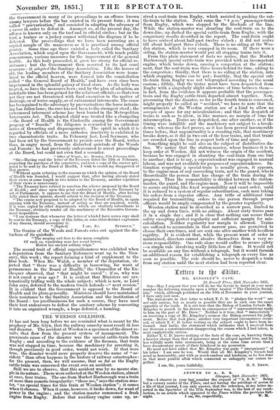THE WEEDON COLLISION.
IT has not been long before we are reminded what is meant by the prophecy of Mr. Glyn, that the railway. anarchy must result in loss and disaster. The accident at Weedon is a specimen of the direct re- sults that flow from the present system of management. The proximate cause of the disaster was the special cattle-train from Rugby • and according to the evidence of the fireman, that train was not stopped in time, because the machinery for arresting it, though previously in good order, would not work. If that were true, the disaster would more properly deserve the name of " ac- cident " than often happens in the history of railway catastrophes : for the present, then, we will assume, that so far as the Rugby cattle-train was concerned the event was an accident.
Still_we are to observe, that this accident was by no means sim- ple kits nature. There were collected at the Weedon station, almost at once, four trains. The one from Market Harborough was a train of more than cometie irregularity: "there are," says the station-mas- ter, "no special times for this train at Weedon station " • it comes when it chooses. When it came, however, it broke down, for want of power in the engine ; and the station-master summoned a fresh engine from Rugby. Before that auxiliary engine came up, ar- rived a coal-train from Rugby, which assisted in pushing the cat- tle-train to the station. Next came the "4 p.m." passenger-train from Rugby, which was stopped by the blockade of the line. While the station-master was shunting the coal-train on to the down-line, up dashed the special cattle-train from Rugby, with the sanguinary results described in the report. The coal-train ought to have arrived about half-past twelve o'clock ; it did not arrive till about half-past three o'clock. There is no siding at the Wee- don station, which is very cramped in its room. If there were a siding, the station-master would put all stopping trains into it. From this plain statement of facts we notice, that the Market Harborough special cattle-train was provided with an incompetent engine, which broke down, causing a congestion at the station; next, that the coal-train was three hours behind its time, adding to the congestion ; thirdly, that there is no siding at the station, into which stopping trains can be put ; fourthly, that the special cat- tle-train from Rugby was not telegraphed according to the usual custom ; fifthly, that the trains must have been despatched from Rugby with a singularly slight allowance of time between them— in fact, from the evidence it appears probable that the passenger- train and the Rugby cattle-train departed almost together. Now, presuming that the disaster, so far as the fourth train is concerned, might properly be called an " accident," we have to note that the arrangements at the Weedon station are of a kind to allow no margin of space for any miscalculation ; and that the despatch of trains is such as to allow, in like manner, no margin of time for misconception. Trains are despatched, one after another, as if the timing were infallible and the machinery not subject to a break- down ; whereas the fact proves, as it has been proved innumerable times before, that unpunetuality is a standing rule, that machinery breaks down, as it did in two out of the four trains, and that trains are crowded upon the line in respect both of time and space.
Something might be said also on the subject of distributive du- ties. We notice that the station-master, whose business it is to keep order at Weedon, did not witness the origin of the accident, because he was engaged in shunting the coal-train from one line to another ; that is to say, a superintendent was engaged in manual labour, and was not available for purposes of superintendence. In- timation respecting a special-train is usually given, it appears, to the engine-man of any succeeding train, not to the guard, who is theoretically the person that has charge of the train during its progress. Thus the responsibility is divided between the station- master, the guard, and the engine-man. Now it will be impossible to secure anything like fixed responsibility and exact order, until it is reduced to a system of regular subordination, each man taking his orders from a superior officer. Any trifle of additional time required for transmitting orders to one person through proper uthcers would be amply compensated by the greater regularity. Weedon station may be described as a narrow pass, limited to the up and down lines, with no sidings. About sixty trains pass it in a single day ; and it is clear that nothing can secure their safety excepting perfect regularity and sufficient margin for mis- calculation. Neither regularity nor margin is allowed. Trains are suffered to accumulate in that narrow pass, are permitted to choose their own times, and are sent one after another with heedless rapidity. It is evident that, while the present want of order is maintained, directors cannot absolve themselves from a very se- rious responsibility. One rule alone would suffice to secure safety —a simple rule involving really little loss of time. It would not be available on any line without a telegraph, but it would furnish an additional reason for establishing a telegraph on every line as soon as possible. The rule should be, never to despatch a train from any station until the next station had been reported clear.


























 Previous page
Previous page